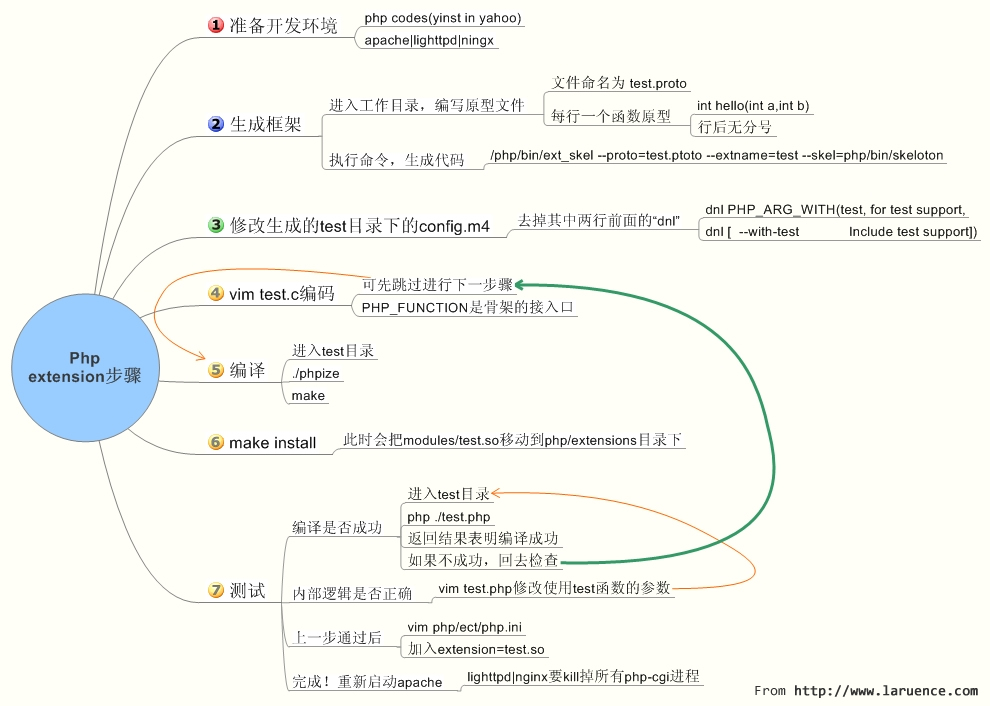用C/C++扩展PHP的优缺点:
优点:
效率,还是效率
减少PHP脚本的复杂度, 极端情况下, 你只需要在PHP脚本中,简单的调用一个扩展实现的函数,然后你所有的功能都就被扩展实现了
而缺点也是显而易见的:
开发复杂
可维护性降低
开发周期变长, 最简单的一个例子,当你用PHP脚本的时候, 如果你发现某个判断条件出错,你只要修改了这一行,保存,那么就立刻能见效。 而如果是在C/C++编写的PHP扩展中, 那你可需要,修改源码,重新编译,然后重新load进PHP, 然后重启Apache,才能见效。
如果你熟悉C,那么编写一个PHP扩展,并不是什么非常难的事情。 PHP本身就提供了一个框架,来简化你的开发。
最简单的方式来开始一个PHP扩展的开发,是使用PHP提供的扩展框架wizard ext_skel, 它会生成一个PHP扩展所必须的最基本的代码, 要使用它,首先你要下载PHP的源码,或者开发包, 进入PHP源码的ext目录, 就会发现这个工具。
生成一个扩展:
./ext_skel --extname=myext
进入/myext,选择扩展类型:
vi config.m4
下面两种类型选一个就行了:
//(依赖外部库)
dnl PHP_ARG_WITH(myext, for myext support,
dnl Make sure that the comment is aligned:
dnl [ --with-myext Include myext support])
//去掉dnl
PHP_ARG_WITH(myext, for myext support,
Make sure that the comment is aligned:
[ --with-myext Include myext support])
//或者将 //(不依赖外部库) dnl PHP_ARG_ENABLE(myext, whether to enable myext support,dnl Make sure that the comment is aligned:dnl [ --enable-myext Enable myext support])//去掉dnl
修改头文件php_myext.h:
//PHP_FUNCTION(confirm_myext_compiled); /* For testing, remove later. */
//修改为
PHP_FUNCTION(myext); /* For testing, remove later. */
修改myext.c:
//将
//zend_function_entry myext_functions[] = {
// PHP_FE(confirm_myext_compiled, NULL) /* For testing, remove later. */
// {NULL, NULL, NULL} /* Must be the last line in myext_functions[] */
//};
//修改为
zend_function_entry myext_functions[] = {
PHP_FE(myext, NULL) /* For testing, remove later. */
{NULL, NULL, NULL} /* Must be the last line in myext_functions[] */
};
//在文件底部添加自己的函数
PHP_FUNCTION(myext)
{
zend_printf("Hello World!\n");
}
安装自己的php扩展myext:
/usr/local/php/bin/phpize
./configure --with-php-config=/usr/local/php/bin/php-config
make
make install
修改php.ini,添加:
extension = "myext.so"
重启web服务器,查看phpinfo,即可看到自己的扩展:

新建测试php文件:
myext();
执行此文件,即可看到再熟悉不过的“Hello World!”。
 如何使用C#编写布隆过滤器算法Sep 21, 2023 am 10:24 AM
如何使用C#编写布隆过滤器算法Sep 21, 2023 am 10:24 AM如何使用C#编写布隆过滤器算法布隆过滤器(BloomFilter)是一种空间效率非常高的数据结构,可以用于判断一个元素是否属于集合。它的基本思想是通过多个独立的哈希函数将元素映射到一个位数组中,并将对应位数组的位标记为1。当判断一个元素是否属于集合时,只需要判断对应位数组的位是否都为1,如果有任何一位为0,则可以判定元素不在集合中。布隆过滤器具有快速查询和
 编写C语言中计算幂函数的方法Feb 19, 2024 pm 01:00 PM
编写C语言中计算幂函数的方法Feb 19, 2024 pm 01:00 PM如何在C语言中编写乘方函数乘方(exponentiation)是数学中常用的运算,表示将一个数自乘若干次的操作。在C语言中,我们可以通过编写一个乘方函数来实现这个功能。下面将详细介绍如何在C语言中编写乘方函数,并给出具体的代码示例。确定函数的输入和输出乘方函数的输入通常包含两个参数:底数(base)和指数(exponent),输出为计算得到的结果。因此,我们
 如何使用C#编写动态规划算法Sep 20, 2023 pm 04:03 PM
如何使用C#编写动态规划算法Sep 20, 2023 pm 04:03 PM如何使用C#编写动态规划算法摘要:动态规划是求解最优化问题的一种常用算法,适用于多种场景。本文将介绍如何使用C#编写动态规划算法,并提供具体的代码示例。一、什么是动态规划算法动态规划(DynamicProgramming,简称DP)是一种用来求解具有重叠子问题和最优子结构性质的问题的算法思想。动态规划将问题分解成若干个子问题来求解,通过记录每个子问题的解,
 如何使用C++编写一个简单的酒店预订系统?Nov 03, 2023 am 11:54 AM
如何使用C++编写一个简单的酒店预订系统?Nov 03, 2023 am 11:54 AM酒店预订系统是一种重要的信息管理系统,它可以帮助酒店实现更高效的管理和更良好的服务。如果你想学习如何使用C++来编写一个简单的酒店预订系统,那么本文将为您提供一个基本的框架和详细的实现步骤。酒店预订系统的功能需求在开发酒店预订系统之前,我们需要确定其实现的功能需求。一个基本的酒店预订系统至少需要实现以下几个功能:(1)客房信息管理:包括客房类型、房间号、房
 如何使用C++编写一个简单的学生选课系统?Nov 02, 2023 am 10:54 AM
如何使用C++编写一个简单的学生选课系统?Nov 02, 2023 am 10:54 AM如何使用C++编写一个简单的学生选课系统?随着科技的不断发展,计算机编程已经成为了一种必备的技能。而在学习编程的过程中,一个简单的学生选课系统可以帮助我们更好地理解和应用编程语言。在本文中,我们将介绍如何使用C++编写一个简单的学生选课系统。首先,我们需要明确这个选课系统的功能和需求。一个基本的学生选课系统通常包含以下几个部分:学生信息管理、课程信息管理、选
 如何用Python编写KNN算法?Sep 19, 2023 pm 01:18 PM
如何用Python编写KNN算法?Sep 19, 2023 pm 01:18 PM如何用Python编写KNN算法?KNN(K-NearestNeighbors,K近邻算法)是一种简单而常用的分类算法。它的思想是通过测量不同样本之间的距离,将测试样本分类到最近的K个邻居中。本文将介绍如何使用Python编写并实现KNN算法,并提供具体的代码示例。首先,我们需要准备一些数据。假设我们有一组二维的数据集,每个样本都有两个特征。我们将数据集分
 如何通过C++编写一个简单的扫雷游戏?Nov 02, 2023 am 11:24 AM
如何通过C++编写一个简单的扫雷游戏?Nov 02, 2023 am 11:24 AM如何通过C++编写一个简单的扫雷游戏?扫雷游戏是一款经典的益智类游戏,它要求玩家根据已知的雷区布局,在没有踩到地雷的情况下,揭示出所有的方块。在这篇文章中,我们将介绍如何使用C++编写一个简单的扫雷游戏。首先,我们需要定义一个二维数组来表示扫雷游戏的地图。数组中的每个元素可以是一个结构体,用于存储方块的状态,例如是否揭示、是否有雷等信息。另外,我们还需要定义
 如何使用C#编写二分查找算法Sep 19, 2023 pm 12:42 PM
如何使用C#编写二分查找算法Sep 19, 2023 pm 12:42 PM如何使用C#编写二分查找算法二分查找算法是一种高效的查找算法,它在有序数组中查找特定元素的位置,时间复杂度为O(logN)。在C#中,我们可以通过以下几个步骤来编写二分查找算法。步骤一:准备数据首先,我们需要准备一个已经排好序的数组作为查找的目标数据。假设我们要在数组中查找特定元素的位置。int[]data={1,3,5,7,9,11,13


Hot AI Tools

Undresser.AI Undress
AI-powered app for creating realistic nude photos

AI Clothes Remover
Online AI tool for removing clothes from photos.

Undress AI Tool
Undress images for free

Clothoff.io
AI clothes remover

AI Hentai Generator
Generate AI Hentai for free.

Hot Article

Hot Tools

VSCode Windows 64-bit Download
A free and powerful IDE editor launched by Microsoft

SublimeText3 Mac version
God-level code editing software (SublimeText3)

Zend Studio 13.0.1
Powerful PHP integrated development environment

mPDF
mPDF is a PHP library that can generate PDF files from UTF-8 encoded HTML. The original author, Ian Back, wrote mPDF to output PDF files "on the fly" from his website and handle different languages. It is slower than original scripts like HTML2FPDF and produces larger files when using Unicode fonts, but supports CSS styles etc. and has a lot of enhancements. Supports almost all languages, including RTL (Arabic and Hebrew) and CJK (Chinese, Japanese and Korean). Supports nested block-level elements (such as P, DIV),

SAP NetWeaver Server Adapter for Eclipse
Integrate Eclipse with SAP NetWeaver application server.






